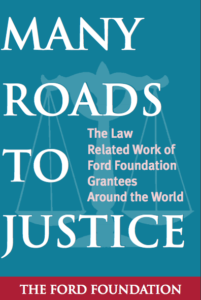From the Village to the University: Legal Activism in Bangladesh (in Many Roads to Justice: The Law-Related Work of Ford Foundation Grantees Around the World)
By: Stephen Golub
This resource is a chapter in “Many Roads to Justice: The Law Related Work of Ford Foundation Grantees Around the World”.
Bangladesh has made significant strides in replacing dictatorship with democracy, reducing poverty, slowing population growth, and overcoming the traumatizing legacy of its bloody 1971 secession from Pakistan. Yet, significant problems remain. The World Bank calculates that 35 percent of the population is “very poor. ” The United Nations Development Programme index of human development indicators ranks it 150th out of 173 countries. Three – quarters of the country’s women and half of its men are illiterate. There is little enforcement of laws promoting gender equality, constitutional assurances notwithstanding. Violence against women—including domestic abuse, rape, and vigilante attacks — is common, as are police beatings and other human rights violations. The barriers of illiteracy, poverty, violence, and social stigma keep many from seeking or obtaining legal redress for their problems.
In view of these conditions, how can dedicated lawyers, NGOs and law professors use the law to address problems plaguing their society? This chapter examines some of their strategies.

